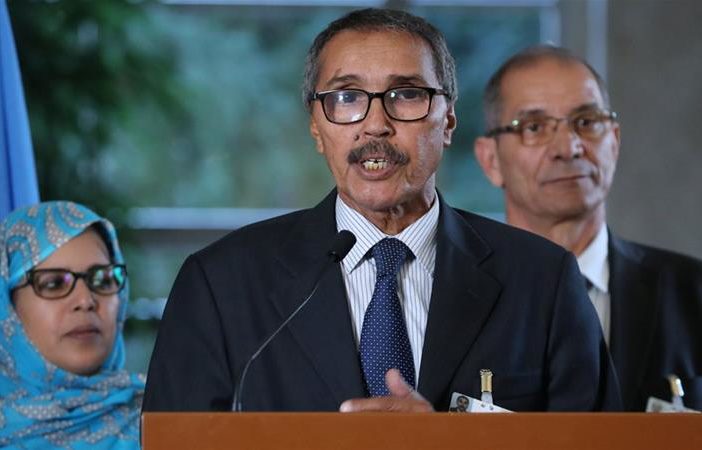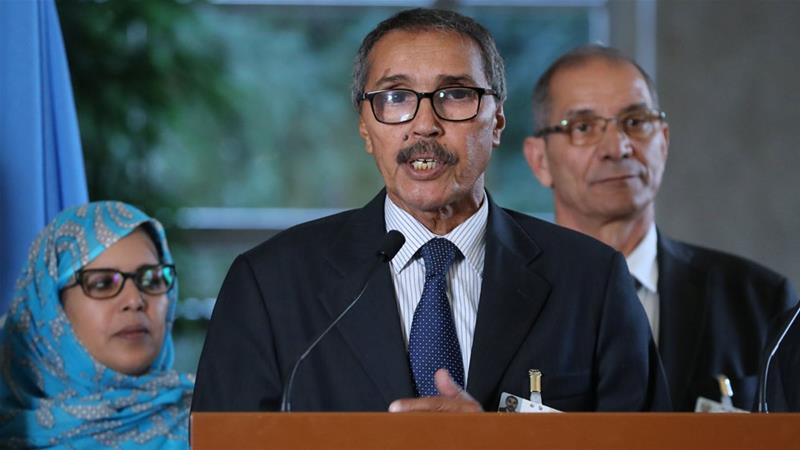Reuters
Aljazeera
UN envoy Horst Koehler says he expects another round of talks to take place in the first quarter of 2019.
Khatri Addouh, leader of the Sahrawi delegation, at the news conference after the roundtable talks [Denis Balibouse/Reuters]
The UN envoy for Western Sahara said he believes a peaceful solution to the decades-long conflict between Morocco and the Polisario Front is possible.
Horst Koehler, a former German president, told reporters in Geneva on Thursday that he was “very pleased to announce the delegations committed to engaging further,” adding all sides promised to meet again for a similar “roundtable” in the first quarter of 2019.
The talks, which were attended by the foreign ministers of Morocco, Algeria, Mauritania, and representatives from the Western Saharan Polisario secessionist movement, are the first to take place since 2012.
“From our discussions, it is clear to me that nobody wins from maintaining the status quo, and it is my firm belief that it lies in the interest of all to resolve this conflict,” Koehler said.
Morocco’s Foreign Minister Nasser Bourita agreed the atmosphere was productive but stressed that in itself was “not enough”.
“A good atmosphere should be translated into genuine will…this moment will have an end if there’s no political will,” Bourita said.
The Integral Part
The disputed Western Sahara region is split by an earth wall with territory east of the structure falling under the control of the Algerian-backed Polisario Front.
Spain relinquished control of the territory in 1975. Morocco and Mauritania then stepped in and claimed the territory as their own.
Mauritania withdrew its claim to the territory and proceeded to recognise the Sahrawi Arab Democratic Republic (SADR) in 1984.
Morocco, which controls roughly 90 percent of the territory including its three main towns, insists it is an integral part of the kingdom.
A UN-backed 1991 ceasefire plan included a referendum to allow the Sahrawi population to determine their own fate but it never took place.
Morocco has offered autonomy to Western Sahara, but Polisario – which waged a low-intensity guerrilla war until a ceasefire in 1991 – reject this and want a referendum with independence for Western Sahara as one of the options.
“Self-determination, in Morocco’s view, is done by negotiation,” Bourita said after the talks. “A referendum is not on the agenda.”
Families torn apart
Polisario negotiator Khatry Adouh said the most democratic solution was to let people choose options in a referendum.
One of the most contentious issues delaying the vote is the eligibility of voters. The Moroccan government has convinced many of its citizens to relocate to the territory through generous subsidies and tax exemptions. As such, it isn’t clear who would partake in any future referendum.
Between 100,000 and 200,000 refugees live in camps near the town of Tindouf in western Algeria, not far from the Moroccan and Western Sahara borders.
Considered a “non-self-governing territory” by the UN, the SADR-run Western Sahara is recognised by 84 states. The territory is also recognised by the African Union, which Morocco rejoined in 2017 after a 33-year absence.
For decades, families from the borderlands have been torn apart: there is a highway straddling the frontier but it is shut. So to cross over, people from Western Sahara have to travel hundreds of kilometres to reach an airport for a flight to Casablanca or Algiers and then travel again by road.
In a statement, Polisario praised US and African Union support for the UN process. But it criticised the European Union for “sustained, illegal and uncompromising efforts to secure trade deals with Morocco, which include the territory of Western Sahara in violation of the rulings of the European Court of Justice”.








